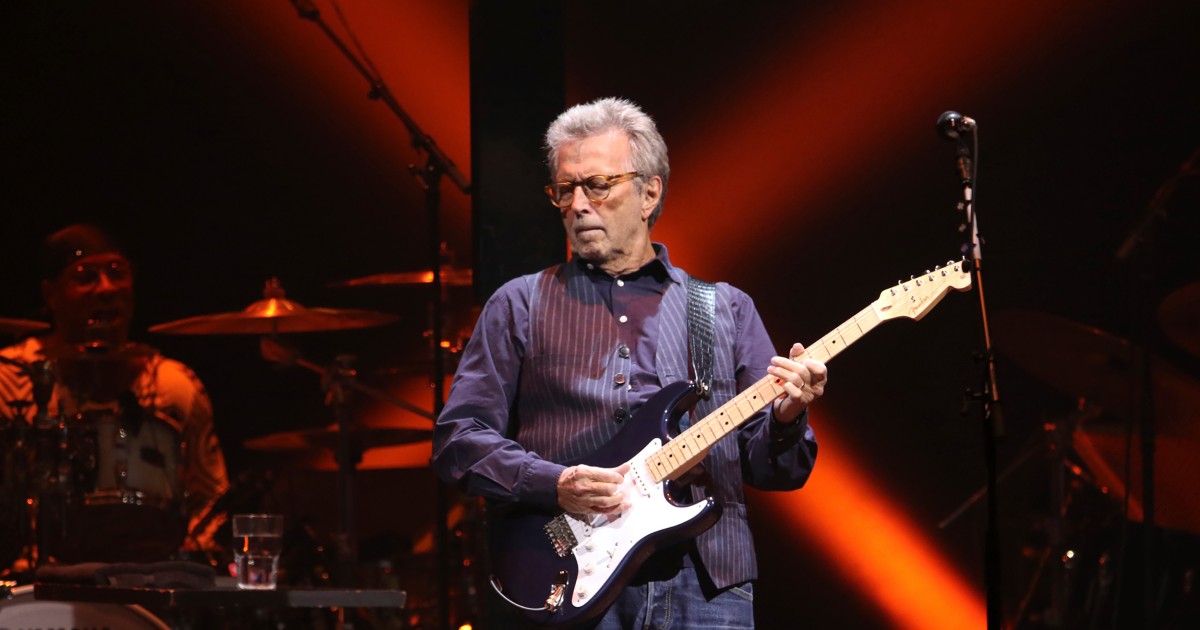
Truth be told, our reckoning with who Eric Clapton really is has been a long time coming.
Clapton may have been branded Rolling Stone magazine’s second-greatest guitarist of all time, and is a three-time Rock & Roll Hall of Fame inductee who has inspired legions to try to follow in his footsteps, but the shiny veneer papering over his belief systems has always been paper thin.
The shiny veneer papering over his belief systems has always been paper thin.
Clapton himself has admitted to being an arrogant, immature “blues purist” during his early career — a time when fans were scrawling “Clapton Is God” graffiti around London. And he left both John Mayall’s Bluesbreakers and the Yardbirds in the lurch, before global superstardom with Cream and the career-defining magnificence of “Layla and Other Assorted Love Songs” sealed his legend status.
What came after that can now be seen as a long, slow decline, culminating in a series of self-inflicted wounds regarding Covid-19. Since last year, Clapton has repeatedly used his vast platform to do his utmost to undermine expert medical advice. He has opposed lockdowns and made suspicious claims about the dangers of vaccines. This spring, he said in videos posted on a friend’s YouTube channel that scientific studies, expert opinions and public health recommendations extolling the importance of vaccines were “propaganda,” and most recently doubled down by vowing he wouldn’t perform to what he termed “discriminated audiences” in venues requiring proof of vaccination.
As some on Twitter noted, Clapton has never really hidden his true nature.
But many fans still seem to have been caught by surprise. In a lengthy piece this month by writer David Browne in Rolling Stone — which has treated the artist with reverence for more than half a century — Clapton is painted as a conspiracy peddler of the highest order, and a racist of the lowest.
“He’s been so relentless with this vax stuff,” Browne told me. “It’s been a year now of making statements and videos. And he hasn’t let up. And after a while it became a question of ‘what is going on here?’”
Browne, like so many of us, grew up with Clapton’s music. But what he found was much worse than he’d imagined. Clapton hasn’t just been spouting Covid vaccine misinformation over the past year — in interviews, in his inarguably terrible Covid protest single, and in his arguably even more awful collaboration with Van Morrison — he’s also been helping to bankroll the fringe, U.K.-based group of anti-vaxx musicians Jam for Freedom.
The article also revisits Clapton’s 1976 racist rant from a stage in Birmingham, England, where he repeatedly shouted slurs and voiced support for the British demagogue Enoch Powell, known for his divisive, race-baiting “rivers of blood” speech in 1968. Browne notes the many times Clapton has joked about or laughed off accusations of racism, as well as a 1968 Rolling Stone interview where he low-key insults Jimi Hendrix’s guitar playing and suggests the allure of Hendrix and other Black artists has to do with their genitalia.
Browne’s piece is a devastating but measured and thoughtful takedown. It digs Clapton’s metaphoric grave via thorough reporting and mounting evidence.
“When Jann Wenner founded Rolling Stone, he wanted it to be the New Yorker of rock journalism,” Browne said. “I think, with that in mind, our new editor-in-chief articulated what many of us were wondering: ‘What’s going on here and how do we explain it?’ So, I went into this not thinking ‘takedown.’ It was more wondering what had happened to Eric Clapton; what had made him dig in his heels so much about this issue; and were there any kind of precedents to him taking a controversial stance.”
Clapton certainly has his defenders, especially among conservative anti-vaxxers. Texas Gov. Greg Abbott, himself no stranger to crackpot conspiracy theories or race baiting, tweeted a picture of himself with Clapton backstage during the guitarist’s recent tour of red state arenas.
But Clapton’s fans may be turning their backs on this legend amid what is likely to be his final act.
“It’s hard to believe this keeps happening — that he keeps doubling down — with everyone saying, ‘Oh my God,’ without consequence,” says Noah Berlatsky, who recently wrote an article in The Independent titled “Surprised Eric Clapton is a conspiracy theorist? Don’t be” (and who is a frequent NBC News THINK contributor). “Even though there are much worse rock stars out there, younger people will see this guy spouting these crackpot conspiracy theories and, if they even bother to dig deeper, will find numerous examples of his blatant racism, as well as his musical colonialism. And they’ll wonder, given his musical output over the past fifty years, what all the fuss was ever about.”
To be fair, Clapton, unlike Michael Jackson or even Jimmy Saville, isn’t some long-dead star. And yet, he refuses to acknowledge or engage with his critics.
“I think that gets at the heart of what a lot of us are dealing with in various types of pop music now,” Browne adds. “You look at, in hip hop, some of the stuff DaBaby has said, or Morgan Wallen, and their fans are dealing with whether or not to listen to their music. I wrestled with it, for sure. Because what’s going on with Eric Clapton — not just the anti-vaccine stance, but everything else, too — really gets at the heart of the art versus the artist question.”
It may be a sad end for one of the legends of the Golden Age of rock and roll, but it also feels fitting. Bigotry and ignorance, in the age of the internet, has a way of catching up with you. In a time when many of us are re-examining how our life experiences and information sources have shaped our world views, Clapton’s racism and conspiracy theories can no longer be ignored.
“Rock and roll was built on rebellion, so it shouldn’t be surprising when we see Morrissey or Johnny Rotten or Eric Clapton saying or doing things that outrage us,” argues Berlatsky. “There’s a lot of space to take up these anti-establishment positions and say ‘I’m a rebel.’”
But more and more aging white guys are finding out that being a reactionary racist isn’t the same as being a contrarian.
In the wake of Clapton’s onstage rant in Birmingham in 1976, as the English Beat’s Dave Wakeling and the writer Red Saunders recounted to Browne, Rock Against Racism was founded. That lead to five years of rallies and concerts, including performances by the Clash, Steel Pulse and even Clapton’s longtime friend Pete Townshend.
“He actually changed the world in the opposite direction, which was very decent of him, really,” Wakeling told Browne, tongue apparently firmly in cheek. An unintended bright spot, perhaps, for Clapton’s now-former fans.
Source: | This article originally belongs to Nbcnews.com









